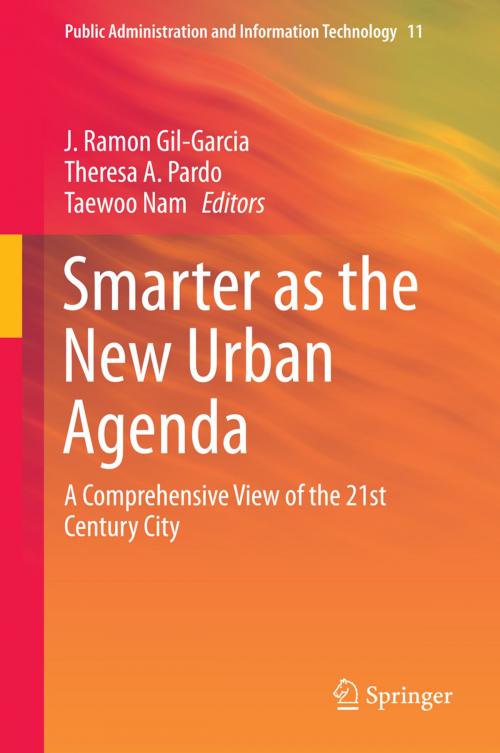Smarter as the New Urban Agenda
A Comprehensive View of the 21st Century City
Nonfiction, Reference & Language, Law, Administrative Law & Regulatory Practice, Business & Finance, Management & Leadership, Production & Operations Management, Social & Cultural Studies, Political Science| Author: | ISBN: | 9783319176208 | |
| Publisher: | Springer International Publishing | Publication: | September 7, 2015 |
| Imprint: | Springer | Language: | English |
| Author: | |
| ISBN: | 9783319176208 |
| Publisher: | Springer International Publishing |
| Publication: | September 7, 2015 |
| Imprint: | Springer |
| Language: | English |
This book will provide one of the first comprehensive approaches to the study of smart city governments with theories and concepts for understanding and researching 21st century city governments innovative methodologies for the analysis and evaluation of smart city initiatives. The term “smart city” is now generally used to represent efforts that in different ways describe a comprehensive vision of a city for the present and future. A smarter city infuses information into its physical infrastructure to improve conveniences, facilitate mobility, add efficiencies, conserve energy, improve the quality of air and water, identify problems and fix them quickly, recover rapidly from disasters, collect data to make better decisions, deploy resources effectively and share data to enable collaboration across entities and domains. These and other similar efforts are expected to make cities more intelligent in terms of efficiency, effectiveness, productivity, transparency, and sustainability, among other important aspects. Given this changing social, institutional and technology environment, it seems feasible and likeable to attain smarter cities and by extension, smarter governments: virtually integrated, networked, interconnected, responsive, and efficient. This book will help build the bridge between sound research and practice expertise in the area of smarter cities and will be of interest to researchers and students in the e-government, public administration, political science, communication, information science, administrative sciences and management, sociology, computer science, and information technology. As well as government officials and public managers who will find practical recommendations based on rigorous studies that will contain insights and guidance for the development, management, and evaluation of complex smart cities and smart government initiatives.
This book will provide one of the first comprehensive approaches to the study of smart city governments with theories and concepts for understanding and researching 21st century city governments innovative methodologies for the analysis and evaluation of smart city initiatives. The term “smart city” is now generally used to represent efforts that in different ways describe a comprehensive vision of a city for the present and future. A smarter city infuses information into its physical infrastructure to improve conveniences, facilitate mobility, add efficiencies, conserve energy, improve the quality of air and water, identify problems and fix them quickly, recover rapidly from disasters, collect data to make better decisions, deploy resources effectively and share data to enable collaboration across entities and domains. These and other similar efforts are expected to make cities more intelligent in terms of efficiency, effectiveness, productivity, transparency, and sustainability, among other important aspects. Given this changing social, institutional and technology environment, it seems feasible and likeable to attain smarter cities and by extension, smarter governments: virtually integrated, networked, interconnected, responsive, and efficient. This book will help build the bridge between sound research and practice expertise in the area of smarter cities and will be of interest to researchers and students in the e-government, public administration, political science, communication, information science, administrative sciences and management, sociology, computer science, and information technology. As well as government officials and public managers who will find practical recommendations based on rigorous studies that will contain insights and guidance for the development, management, and evaluation of complex smart cities and smart government initiatives.















